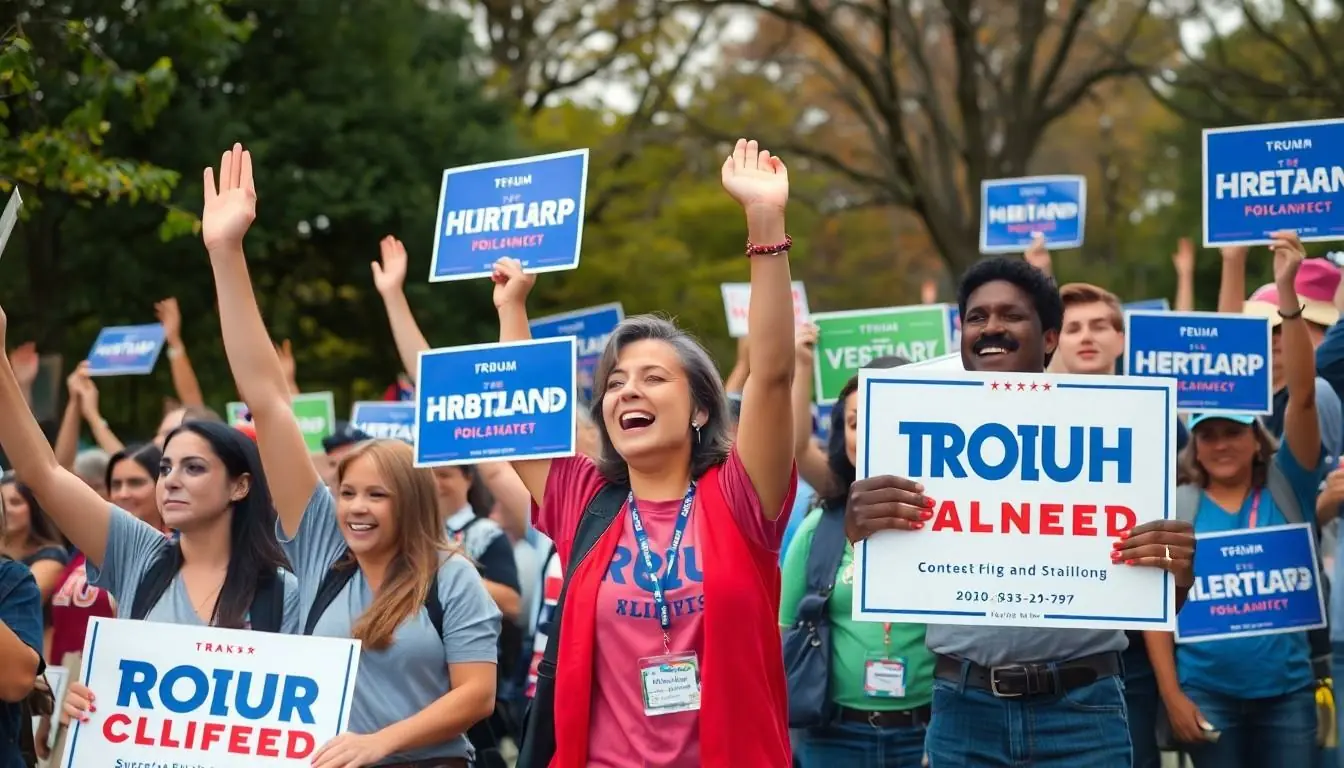Political campaigns often feel like a whirlwind of promises, debates, and catchy slogans, but have you ever wondered if they’re also dodging the taxman? It’s a question that stirs curiosity and perhaps a chuckle or two. After all, who wouldn’t want to know if the next big election is a tax-free bonanza for candidates?
Table of Contents
ToggleUnderstanding Tax-Exempt Status
Tax-exempt status refers to organizations or activities not subject to federal income tax. Political campaigns often try to navigate this status, but specific criteria exist. Many political entities qualify under section 527 of the Internal Revenue Code. This statute allows tax-exempt status for organizations primarily focused on influencing elections or legislative processes.
Campaign contributions fall under these regulations. Candidates report contributions received from individuals or groups, and donors may not claim these as tax deductions, despite campaigns being tax-exempt.
Specific activities must meet strict guidelines to maintain this status. Campaigns must engage in political advocacy without significant association with business operations or unrelated activities.
In some instances, political action committees (PACs) operate with perceived tax-exempt benefits. PACs engage in political strategies to support candidates or causes, all while adhering to the limits set under the campaign finance laws.
Unrelated business income (UBI) generated by political organizations can jeopardize tax-exempt status. If campaigns engage in commercial activities, they risk incurring tax liabilities on the income generated.
Campaign organizations typically file a Form 990 with the IRS. This form requires detailed financial information, ensuring transparency about their operations and funding.
Understanding these regulations helps clarify the financial structures behind political campaigns. The tax-exempt status significantly influences funding, strategy, and overall campaign dynamics in elections.
Overview of Political Campaigns

Political campaigns play a crucial role in the electoral process, influencing voter decisions and legislative outcomes. Understanding their structure and function reveals much about the financial dynamics involved.
Definition of Political Campaigns
Political campaigns refer to organized efforts aimed at influencing the decision-making process within a specific electoral context. These campaigns typically focus on seeking election to public office, promoting particular political ideologies, or advocating for specific policy issues. Campaigns encompass a range of activities, from canvassing and fundraising to advertising and public speaking. Engaging various stakeholders, they strive to garner support from voters, party members, and donors while adhering to legal frameworks.
Types of Political Campaigns
Various types of political campaigns exist, each serving distinct purposes. Candidate campaigns focus on individuals running for office, leveraging strategies to gain voter support. Issue campaigns concentrate on specific topics such as healthcare or education reform, aiming to influence public opinion and policy decisions. Additionally, party campaigns promote the ideals and candidates of a political party, enhancing its visibility and impact during elections. Grassroots campaigns mobilize local constituencies, appealing directly to community members to drive change, while independent campaigns operate outside established party structures. Each campaign type plays a vital role in shaping the political landscape and directing voter engagement.
Tax Regulations for Political Activities
Political campaigns face specific tax regulations that shape their operational landscape. Understanding these guidelines ensures compliance while maximizing tax-exempt benefits.
IRS Guidelines on Tax-Exempt Organizations
The Internal Revenue Service (IRS) defines tax-exempt organizations under Section 527. This classification applies specifically to entities that aim to influence elections or legislative processes. Campaigns must primarily engage in political activities without significant involvement in unrelated business activities. To maintain tax-exempt status, campaigns must file a Form 990, which reports their financial status and operations. Transparency helps verify adherence to regulations. Furthermore, campaigns cannot offer tax deductions for contributions, ensuring that donors remain aware of their financial involvement.
Political Campaigns vs. Charitable Organizations
Political campaigns differ from charitable organizations in several ways. Charitable organizations qualify under Section 501(c)(3), focusing on broader charitable purposes, such as education or relief for the poor. Campaigns, however, concentrate on supporting candidates and influencing election outcomes. While both types of organizations share tax-exempt status, political campaigns operate under stricter regulations. Contributions to campaigns lack tax deductibility, contrasting with donations to charitable organizations. This distinction emphasizes the unique financial dynamics governing political activities versus charitable initiatives.
Are Political Campaigns Tax-Exempt?
Political campaigns often seek tax-exempt status under specific guidelines, primarily Section 527 of the Internal Revenue Code. This status allows them to operate without federal income tax liabilities while focusing on political advocacy.
Criteria for Tax-Exempt Status
To qualify for tax-exempt status, political campaigns must meet certain criteria established by the IRS. Campaigns need to focus on influencing elections or legislative processes. They must also refrain from engaging significantly in unrelated business activities. Strict adherence to these guidelines helps maintain their tax-exempt status. Moreover, transparency is crucial; campaigns are required to file a Form 990, ensuring their financial operations remain accessible and accountable.
Exceptions and Limitations
Tax-exempt status for political campaigns includes exceptions and limitations that can impact their operations. Contributions made to these campaigns are not tax-deductible for donors, unlike charitable organizations. Additionally, campaigns face challenges related to unrelated business income, which can jeopardize their tax-exempt status. They must navigate these limitations carefully to preserve their benefits while operating within legal frameworks. Compliance with IRS regulations is essential for maintaining their tax-exempt status and ensuring successful political advocacy.
Implications of Tax-Exempt Status
Tax-exempt status significantly affects political campaigns, particularly relating to their financing and legal obligations.
Impact on Campaign Financing
Tax-exempt status allows campaigns to allocate more funds towards advocacy and outreach. It also reduces financial burdens, enabling candidates to focus on efforts like advertising and grassroots campaigns. Donors often prefer providing contributions to tax-exempt organizations, believing their funding resonates with specific political goals. Despite not being tax-deductible for donors, this setup encourages larger contributions, enhancing a campaign’s operational capacity. Campaigns under Section 527 benefit from a broader range of financing options while adhering to strict IRS guidelines. Clear reporting of contributions also boosts transparency, creating trust among stakeholders and the public.
Consequences of Non-Compliance
Non-compliance with IRS regulations can jeopardize a campaign’s tax-exempt status, leading to significant financial repercussions. Campaign organizations are at risk of losing tax benefits if they engage in unrelated business activities. Such violations may also result in penalties, including back taxes on previously exempt income. Furthermore, transparency suffers, eroding donor confidence and public trust. Candidates face challenges reconstructing their financial integrity after losing tax-exempt privileges, as regaining compliance often proves difficult. Awareness of compliance requirements is crucial for maintaining financial health and operational effectiveness within political campaigns.
Understanding the tax-exempt status of political campaigns sheds light on their financial operations and implications. Campaigns can navigate complex regulations under Section 527, allowing them to focus resources on advocacy and outreach. This status not only enhances their funding capabilities but also requires strict adherence to IRS guidelines.
While contributions aren’t tax-deductible for donors, the structure encourages larger donations, vital for campaign success. However, the risks of non-compliance underline the importance of transparency and adherence to regulations. Ultimately, the financial dynamics of political campaigns significantly impact their strategies and effectiveness in influencing voters and shaping the political landscape.





